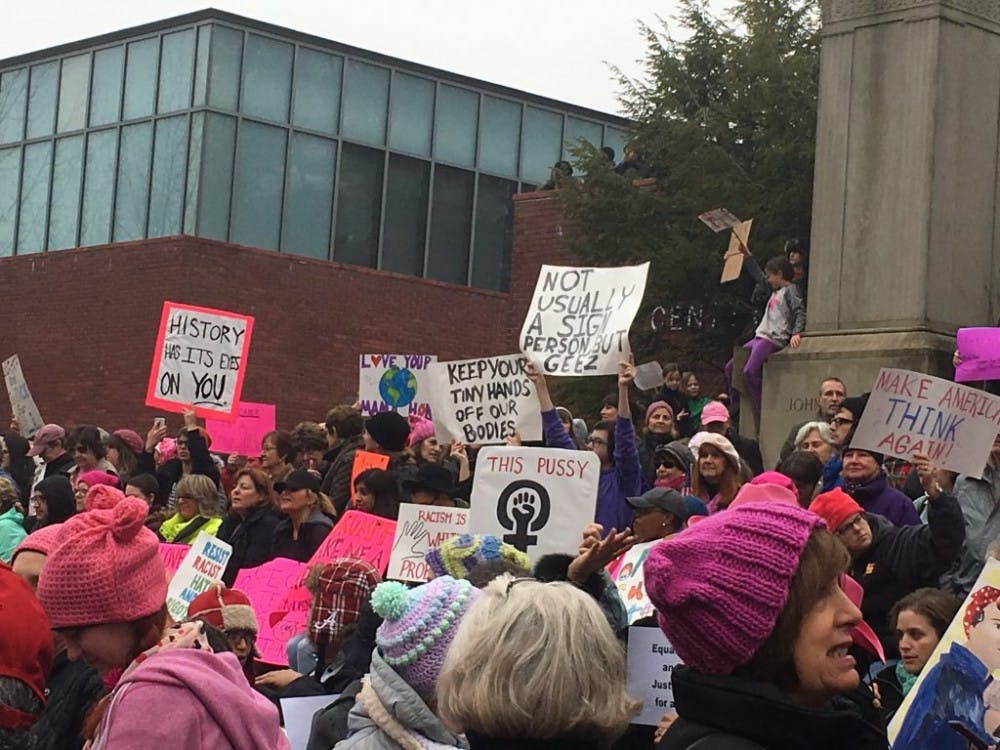As we enter the next four years of America, it seems like a lot of people are taking a greater interest in politics and activism than they previously had. Protests are popping up all over the place, from the Women’s March to the anti-Muslim ban protests at international airports across the country.
As protesters we often embrace labels and symbols to help assert our beliefs, to align ourselves with our allies, to unite under a common goal. We call ourselves feminists, we shout that black lives matter, we carry rainbow flags. But calling ourselves feminists doesn’t mean anything unless we back it up with our actions.
Taking on a label can often provide comfort and remind us that we’re not alone. When millions of feminists around the world marched on Jan. 21, we knew we were not alone. When hundreds of other people around you are yelling the same phrase, “pro immigrant/queer/black/trans/indigenous/anything else lives,” we know that we aren’t the only ones with these beliefs.
Except until you take a step further, that’s all they are, beliefs. Walking in a march and storming an airport are amazing ways to get involved, but that can’t be the end for you or for me. Lending our bodies and our voices on one day should not be underestimated, but in order to effect real change, we need to stand up and speak out every single day.
I’m guilty of this too. I sit down. I joined 2,000 others at the Baltimore Women’s March, and then I went to Chipotle. I bought my food and I went home and I probably watched something inconsequential on Netflix. There’s nothing inherently wrong with that necessarily, because we are so much more than our labels of activism. I am a student. I am a young woman trying to take advantage of her parents’ Netflix account. I am not a human rights lawyer or a full time activist or anything like that.
We just can’t make every day like that. As long as we keep working, even in the smallest of ways, we can proudly stand together and proclaim that we are feminists, that black lives matter, that love is love.
So what can we do? What can we, students, workers, parents, children, actually accomplish? Honestly it’s often easier than you think.
It can be as simple as staying informed. For example, let’s talk about the pink knitted p*ssy hats you saw all over the place at the Women’s March. On the surface they seem like a great way for us to unite as women, combat the perception of the color pink as weak and girly and reclaim a word often used as an insult. However, the word “p*ssy” refers to traditionally female genitalia, which alienates trans women and other people who identify as women but do not have a vagina.
Another easy way to affect change is to call, email and send letters to your senators and representatives. Though they may not share your beliefs on a specific issue on which they’re voting, they have an obligation to represent the views of their constituents. You might think you’re just one person, but your phone call can make a huge difference.
The last piece I will impart on you is that sometimes your money goes farther than your mouth does. I know, I know, that was just so capitalist of me. But it’s true. Even if it’s not much, maybe think about setting aside a few dollars of each paycheck to send to an organization that has access to more resources and bigger people than you do. There are the big ones, like the ACLU and Planned Parenthood, but also think about looking into smaller, more local organizations that are impacting immediate change in your community.
Of course, keep protesting. Keep shouting. Keep embracing labels that bring you closer in your dissent. Just consider the things you can do to stay active and involved.
Gillian Lelchuk is a junior Writing Seminars and mathematics double major from Los Alamitos, Calif. She is the Opinions Editor.

















